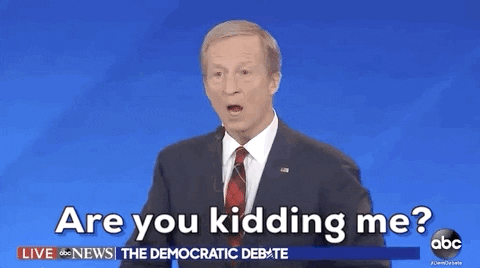I don't know. I'm not sold. Take this paragraph for instance:
I don't want to put words in the protesters' mouths, but it seems to me that this is exactly their point. She even said so: to her, there is no distinction. If Pete and Trump are the same, then Bloomberg is also the same. Racism is racism. Not all racism is wielded malevolently, but that doesn't make it not racism.
What Friedersdorf frames as "crying wolf" we could also call "declaring zero tolerance." Gone are the days of the culture quibbling over the threshold for acceptable levels of racist attitudes and actions; instead, we have turned to simply naming it for what it is. How people incorporate that information into their larger worldview and behavioral patterns is up to them; but the alternative, to go along to get along, has also ceased to be a winning strategy. In fact, naming racism and being a faction of dissent within the party has in some cases seen some concrete results in forcing candidates to do better in both word and action.
And here's the nut of it; I agree with the first half of this quote. After an unintended transgression, the message you see online is often "Person X is trash," in the parlance of our time, and not "Person X has a responsibility to understand why this is wrong and how to do better." But again, part of the trajectory that led us to this place is the growing impatience with being required to say these things. If Person X is thoughtful and putting in the work and doing their best, they will take the responsibility to learn and improve before they are told why or how. The responsibility is greater than it used to be: not just to learn and do better, but to do it proactively and without burdening affected groups with that task.
As for the second half of that last quote, I disagree, and I don't see any evidence that the electorate is growing less able to distinguish between transgressions. If anything we are developing a more sophisticated and nuanced understanding of how things like racism don't only manifest in robes and segregation but also in the patterns of our speech and our latent attitudes about societal norms.
Are Pete and Trump and Bloomberg the same person? I think we would all say not. But their racism, when and where it reveals itself, is the same disease that afflicts all of us. The irony of being told that call-out culture is weakening the case against racism is that being tired of racism itself does nothing to prevent it.



